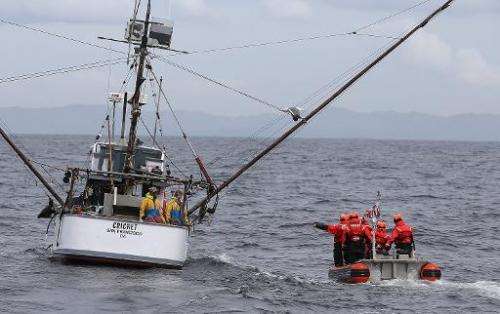Numbers back high seas fishing ban

Fishing the high seas is a losing investment, an economist told political leaders, corporate kings and environmental warriors Wednesday, backing calls for protecting the open seas.
McKinsey & Company director Martin Stuchtey subtracted politics from the equation and laid out numbers showing that a ban on high seas fishing would cost $2 per person on the planet, while returning $4 per person.
"You would need to spend the two dollars to get the four dollars; that is much better than anything the bank offers you right now," Stuchtey told AFP after an on-stage chat at a World Ocean Summit organized by The Economist weekly newspaper.
A handful of nations spend lots of money subsidizing fleets that must range farther and farther at sea for fish as stocks are depleted. The bulk of their catch goes to developed nations.
Ending subsidies and the practice would result in huge financial savings, as well as let sea life rebound and regenerate areas designated by the United Nations as exclusive economic zones in which countries have rights to resources, according to Stuchtey.
Stuchtey's figures, which he promised to publish soon, backed calls declaring all the world's open ocean protected marine areas complete with enforcement to stop illegal fishing.
Hard numbers reveal that today's fishing industry is not profitable and as fleets work harder chasing fewer fish, the losses grow and stocks are further depleted in "a race to the bottom," the economist explained.
"The case of the ocean stands upon good old-fashioned economics," Stuchtey said.
"It is often hidden behind complex relationships, short-term interests and entrenched behaviors."
Summit participants pointed to the need to translate the destruction of seas and marine life into economic values that everyone, from world leaders to fishermen, can take to heart.
Factoring the value of "natural capital" off coasts into the wealth of countries promises to change the way nations manage such assets and to turn some countries from aid cases into investment opportunities, said World Bank vice president and special envoy for climate change Rachel Kyte.
"We will have to use economic modeling that counts in natural resources and the cost of policy measures," she added.
"We are just starting to do that."
US Secretary of State John Kerry and Prince Albert II of Monaco were among summit speakers calling for meaningful action to save the ocean on which life depends.
They pointed to the need for sustainability when it comes to fisheries and other sea resources, and for nations to work together on the issues.
Among the threats to these resources are illegal fishing practices smashing food chains and wiping out species, pollution, including fertilizer run-off from inland farms, and climate change.
© 2014 AFP





















